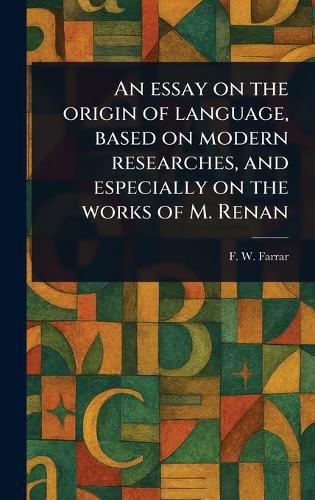Readings Newsletter
Become a Readings Member to make your shopping experience even easier.
Sign in or sign up for free!
You’re not far away from qualifying for FREE standard shipping within Australia
You’ve qualified for FREE standard shipping within Australia
The cart is loading…






This title is printed to order. This book may have been self-published. If so, we cannot guarantee the quality of the content. In the main most books will have gone through the editing process however some may not. We therefore suggest that you be aware of this before ordering this book. If in doubt check either the author or publisher’s details as we are unable to accept any returns unless they are faulty. Please contact us if you have any questions.
Delve into the fascinating world of language origins with Frederic William Farrar's "An Essay on the Origin of Language, Based on Modern Researches." This historical work explores the development of language, drawing upon linguistic research and etymology to examine the roots of human communication. Farrar meticulously investigates the subject of language and languages, offering insights into the fundamental principles of linguistics.
A valuable resource for anyone interested in language arts and disciplines, this essay presents a comprehensive overview of the theories and concepts surrounding language development. Whether you are a student of linguistics, a writer seeking a deeper understanding of language, or simply curious about the evolution of human expression, this book offers a stimulating and thought-provoking exploration of a timeless subject.
This work has been selected by scholars as being culturally important, and is part of the knowledge base of civilization as we know it.
This work is in the public domain in the United States of America, and possibly other nations. Within the United States, you may freely copy and distribute this work, as no entity (individual or corporate) has a copyright on the body of the work.
Scholars believe, and we concur, that this work is important enough to be preserved, reproduced, and made generally available to the public. We appreciate your support of the preservation process, and thank you for being an important part of keeping this knowledge alive and relevant.
$9.00 standard shipping within Australia
FREE standard shipping within Australia for orders over $100.00
Express & International shipping calculated at checkout
Stock availability can be subject to change without notice. We recommend calling the shop or contacting our online team to check availability of low stock items. Please see our Shopping Online page for more details.
This title is printed to order. This book may have been self-published. If so, we cannot guarantee the quality of the content. In the main most books will have gone through the editing process however some may not. We therefore suggest that you be aware of this before ordering this book. If in doubt check either the author or publisher’s details as we are unable to accept any returns unless they are faulty. Please contact us if you have any questions.
Delve into the fascinating world of language origins with Frederic William Farrar's "An Essay on the Origin of Language, Based on Modern Researches." This historical work explores the development of language, drawing upon linguistic research and etymology to examine the roots of human communication. Farrar meticulously investigates the subject of language and languages, offering insights into the fundamental principles of linguistics.
A valuable resource for anyone interested in language arts and disciplines, this essay presents a comprehensive overview of the theories and concepts surrounding language development. Whether you are a student of linguistics, a writer seeking a deeper understanding of language, or simply curious about the evolution of human expression, this book offers a stimulating and thought-provoking exploration of a timeless subject.
This work has been selected by scholars as being culturally important, and is part of the knowledge base of civilization as we know it.
This work is in the public domain in the United States of America, and possibly other nations. Within the United States, you may freely copy and distribute this work, as no entity (individual or corporate) has a copyright on the body of the work.
Scholars believe, and we concur, that this work is important enough to be preserved, reproduced, and made generally available to the public. We appreciate your support of the preservation process, and thank you for being an important part of keeping this knowledge alive and relevant.